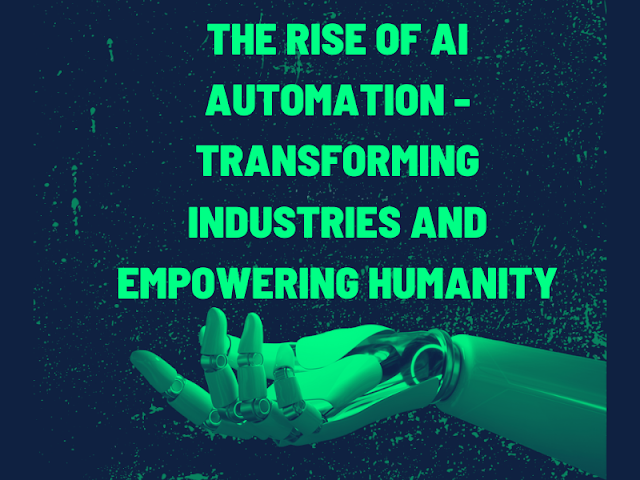The Rise of AI Automation: Transforming Industries and Empowering Humanity
The Rise of AI Automation: Transforming Industries and Empowering Humanity
Introduction
Artificial Intelligence (AI) automation has emerged as a revolutionary force reshaping industries, businesses, and the way we live and work. With remarkable advancements in AI technology, automation is rapidly becoming an integral part of various sectors, leading to increased efficiency, productivity, and innovation. This article explores the impact of AI automation on different industries, its benefits, challenges, and its potential to empower humanity.
- Understanding AI Automation
AI automation refers to the integration of artificial intelligence systems with automation technologies to perform tasks that were traditionally carried out by humans. It involves the use of algorithms, machine learning, natural language processing (NLP), computer vision, and robotics to replicate human actions and decision-making processes. The goal is to streamline processes, reduce errors, and accelerate tasks that would otherwise be time-consuming for humans.
- AI Automation in Industries
a) Manufacturing and Robotics: AI-driven robots are revolutionizing manufacturing industries by handling repetitive and dangerous tasks with precision and safety. Robots equipped with computer vision can inspect products for defects, while collaborative robots (cobots) work alongside humans to enhance productivity.
b) Healthcare: AI automation is transforming healthcare with applications like medical image analysis, drug discovery, personalized treatment plans, and virtual health assistants. It streamlines administrative tasks, allowing medical professionals to focus on patient care.
c) Finance: In the financial sector, AI automates data analysis, fraud detection, risk assessment, and customer support through chatbots. AI-driven trading algorithms optimize investment strategies and portfolio management.
d) Transportation: The rise of AI-powered autonomous vehicles is redefining transportation. Self-driving cars promise safer roads and improved logistics, while drones are revolutionizing delivery services.
e) Customer Service: AI-driven chatbots and virtual assistants provide instant and personalized responses to customer queries, enhancing the overall customer experience.
- Benefits of AI Automation
a) Increased Efficiency: AI automation enables businesses to complete tasks faster and more accurately, boosting productivity and reducing operational costs.
b) Error Reduction: Automation minimizes human errors, particularly in repetitive tasks, leading to better quality and consistency.
c) Cost Savings: Companies can save costs on labor, training, and operational expenses by implementing AI automation.
d) Improved Safety: Dangerous and hazardous tasks can be assigned to AI-powered robots, reducing the risk of accidents and injuries for human workers.
e) Enhanced Decision-making: AI automation processes vast amounts of data quickly, providing valuable insights for better decision-making.
f) Creativity and Innovation: By offloading mundane tasks to AI systems, human workers can focus on more creative and strategic aspects of their jobs, fostering innovation within organizations.
- Challenges and Concerns
a) Job Displacement: As AI automation replaces some human roles, concerns arise about job displacement and the need for upskilling and reskilling the workforce.
b) Bias and Ethics: AI algorithms are only as unbiased as the data they are trained on. Without careful attention, automation can perpetuate existing biases or ethical dilemmas.
c) Security and Privacy: With the increasing reliance on AI, protecting sensitive data and ensuring cybersecurity become critical concerns.
d) Lack of Human Touch: In certain sectors, the absence of human interaction might impact customer experience and satisfaction.
- Empowering Humanity with AI Automation
a) New Job Opportunities: While automation may displace some jobs, it also creates new roles, requiring human expertise in designing, maintaining, and enhancing AI systems.
b) Work-Life Balance: AI automation can reduce the burden of mundane tasks, allowing individuals to achieve a better work-life balance.
c) Healthcare Advancements: AI automation in healthcare leads to improved medical outcomes, personalized treatment plans, and greater accessibility to healthcare services.
d) Environmental Impact: Automation can be utilized to optimize resource usage, leading to more sustainable practices and reduced environmental impact.
Conclusion
AI automation is a powerful force that is reshaping industries, enhancing efficiency, and empowering humanity. As we move forward, it is essential to strike a balance between embracing automation for its benefits and addressing the challenges it poses. By fostering responsible AI development, promoting education, and creating ethical frameworks, we can harness the potential of AI automation to drive progress and improve the lives of people worldwide.
AI:
 Reviewed by SSC NOTES
on
July 28, 2023
Rating:
Reviewed by SSC NOTES
on
July 28, 2023
Rating:
